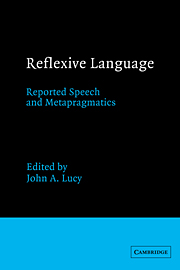Book contents
- Frontmatter
- Contents
- Acknowledgments
- General introduction
- Part I Theoretical foundations
- Part II The relation of form and function in reflexive language
- Part III Text, context, and the cultural functions of reflexive language
- Introduction to Part III
- 7 Generic versus metapragmatic dimensions of Warao narratives: who regiments performance?
- 8 Performance form and the voices of characters in five versions of the Wasco Coyote Cycle
- 9 The represented functions of speech in Shokleng myth
- 10 The political function of reported speech: a Belauan example
- Part IV Interpretation, reported speech, and metapragmatics in the Western tradition
- Name index
- Subject index
Introduction to Part III
from Part III - Text, context, and the cultural functions of reflexive language
Published online by Cambridge University Press: 22 January 2010
- Frontmatter
- Contents
- Acknowledgments
- General introduction
- Part I Theoretical foundations
- Part II The relation of form and function in reflexive language
- Part III Text, context, and the cultural functions of reflexive language
- Introduction to Part III
- 7 Generic versus metapragmatic dimensions of Warao narratives: who regiments performance?
- 8 Performance form and the voices of characters in five versions of the Wasco Coyote Cycle
- 9 The represented functions of speech in Shokleng myth
- 10 The political function of reported speech: a Belauan example
- Part IV Interpretation, reported speech, and metapragmatics in the Western tradition
- Name index
- Subject index
Summary
Part III, “Text, context, and the cultural functions of reflexive language,” explores the cultural significance of reflexive language and the pragmatic effects which can be obtained by creative manipulation of the parameters and boundaries of reported speech and current speech, text and context. In any situation where there are multiple ways of reporting speech in a community, the selection of or emphasis on one or another technique carries significance. For example, a focus of interest in the chapters presented here is the association between direct report (or literal re-enactment) and perceived authoritativeness. Direct quotation is apparently perceived as more authoritative because listeners recognize that such reports are relatively less subject to alteration in the speaker's interests and, inversely, authoritative speech tends to be directly quoted out of respect for its social value. Nonetheless, skillful speakers can succeed in projecting their own voice into the reported speech. Manipulations of this sort utilize the perceived authoritativeness of the narratives to achieve both personal and cultural ends. In this sense they can be persuasive in quite a different fashion than indirect reports, which more overtly adapt the report to current interests and circumstances.
The first two chapters focus on multiple performances of the “same” text in order to explore the interaction of text and performance context.
Information
- Type
- Chapter
- Information
- Reflexive LanguageReported Speech and Metapragmatics, pp. 177 - 178Publisher: Cambridge University PressPrint publication year: 1993
Accessibility standard: Unknown
Why this information is here
This section outlines the accessibility features of this content - including support for screen readers, full keyboard navigation and high-contrast display options. This may not be relevant for you.Accessibility Information
- 1
- Cited by
